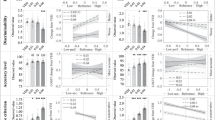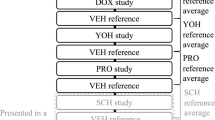Abstract
The effects of fixed-ratio (FR) size, scopolamine, and the interactions between FR size and scopolamine were investigated in male F344 rats on working memory as assessed by spatial alternation behavior maintained under FR schedules of food presentation where the interval between trials was varied among values of 2, 4, 8, 16, and 32 s within each session. The magnitude of the FR size on the correct and incorrect levers was varied systematically from 1 response to 2, 4, 8, or 16 responses in order to determine whether the FR size influenced either the percentage of correct responding, rates of responding, or both. Under the primary baseline condition, that is when the FR size on both the correct and incorrect levers was one response (designated FR1 FR1), the percentage of correct responses decreased with increasing retention interval duration. Increasing the FR size on the correct lever produced FR-dependent increases in the percentage of correct responding as well as in rates of responding. Increasing the FR size on the incorrect lever produced FR-dependent decreases in correct responding, but had little effect on rates of responding. Dose-effect curves for scopolamine were determined on performance maintained under FR values on the correct and incorrect levers, respectively, of FR1 FR1, FR1 FR10, FR10 FR1, and FR10 FR10. In general, scopolamine produced dose-related decreases in the percentage of correct responding, although the magnitude of the effects of scopolamine varied not only with dose, but also with the length of the retention interval and with changes in FR size. Rates of responding during trials were dose-dependently decreased by scopolamine under all schedule parameters. The present results are consistent with the interpretation that scopolamine can selectively impair time-dependent memory processes such as working memory, but also can impair time-independent variables which affect performance, dependent on dose and schedule maintaining the behavior.
Similar content being viewed by others

References
Barrett JE (1985) Modification of the behavioral effects of drugs by environmental variables. In: Seiden LS, Balster RL (eds) Behavioral pharmacology: the current status. Liss, New York, pp 7–22
Bartus RT, Johnson HR (1976) Short-term memory in the rhesus monkey: disruption from the anti-cholinergic scopolamine. Pharmacol Biochem Behav 5:39–46
Beninger RJ, Wirsching BA, Jhamandas K, Boegman RJ (1989) Animal studies of brain acetylcholine and memory. Arch Gerontol Geriatr Suppl 1:71–89
Ferster CB, Skinner BF (1957) Schedules of reinforcement. Appleton-Century-Crofts, New York
Heise GA, Hrabrich B, Lilie NL, Martin RA (1975) Scopolamine effects on delayed spatial alternation in the rat. Pharmacol Biochem Behav 3:993–1002
Heise GA, Conner R, Martin RA (1976) Effects of scopolamine on variable intertrial interval spatial alternation and memory in the rat. Psychopharmacology 49:131–137
Kirk RE (1982) Experimental design: procedures for the behavioral sciences, 2nd ed. Brooks/Cole Publishing Co., Belmon, CA
Leander JD (1981) Antagonism of oxotremorine-induced behavioral suppression by antimuscarinic drugs. Psychopharmacology 75:5–8
McKearney JW (1979) Interrelations among prior experience and current conditions in the determination of behavior and the effects of drugs. Adv Behav Pharmacol 2:39–64
Morris RG, Baddeley AD (1988) Primary and working memory functioning in Alzheimer-type dementia. J Clin Exp Neuropsychol 10:279–296
SAS User's Guide (1985) Statistics, Version 5 Cary NC (ed) SAS Institute Inc
Shannon HE, Bemis KG, Hart JC (1988) Short-term memory in rats as assessed by single-spatial alternation behavior with variable retention intervals: effects of scopolamine. Presented at Joint APS/ASPET Meeting, Montreal, Canada, October 9–13
Wenger GR (1979) Effects of physostigmine, atropine and scopolamine on behavior maintained by a multiple schedule of food presentation in the mouse. J Pharmacol Exp Ther 209:137–143
White SR (1974) Atropine, scopolamine and hippocampal lesion effects on alternation performance of rats. Pharmacol Biochem Behav 2:297–307
Witkin JM, Gordon RK, Chiang PK (1987) Comparison of in vitro actions with behavioral effects of antimuscarinic agents. J Pharmacol Exp Ther 242:796–803
Author information
Authors and Affiliations
Rights and permissions
About this article
Cite this article
Shannon, H.E., Bemis, K.G. & Hart, J.C. Assessment of working memory in rats using spatial alternation behavior with variable retention intervals: effects of fixed-ratio size and scopolamine. Psychopharmacology 100, 491–497 (1990). https://doi.org/10.1007/BF02244001
Received:
Revised:
Issue Date:
DOI: https://doi.org/10.1007/BF02244001



